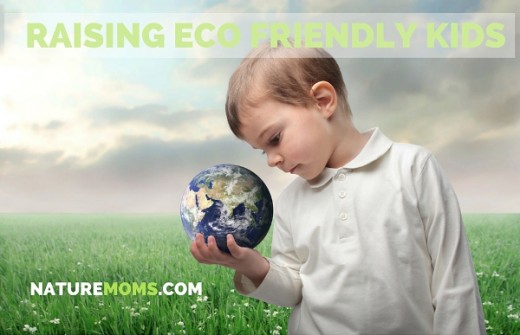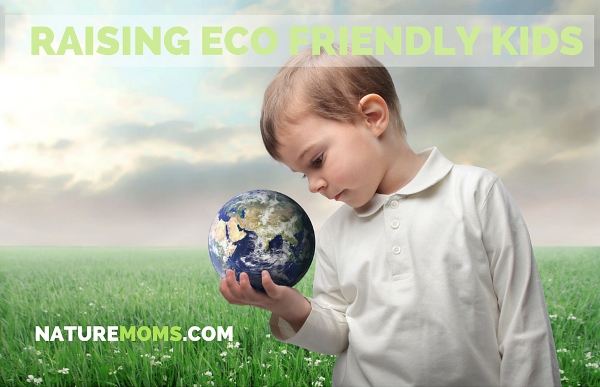Society today is becoming apathetic to the world around us. Many children in particular are more concerned with playing the latest video game and don’t really pay much attention to the environment around them. They have nature deficit disorder and it can be hard to get them to show an interest in the natural world, but you can get them to care if you start early and take small steps. You may not make a difference overnight, but you may just make a difference in the future of the planet. Don’t let your kids become adults who care more about making money, acquiring “things”, entertaining themselves, and in general keeping up with the Jones’s. Raise kids who care about this planet we share.
The first step in raising your children to be eco friendly is to be eco friendly yourself. You need to walk the walk. You can tell your children to respect the environment all you want, but you’re not going to get anywhere if you don’t practice what you preach. Follow the practices of refusing, reducing, reusing, and recycling. Use natural and environmentally friendly products, especially reusables. Get involved with local organizations that help protect the environment and preserve patches of nature in your neck of the woods.
Once you’re involved in eco friendly practices, start getting your kids to help as soon as you can. You can start out with easy steps like having them put their own recyclables into the bin, or even have them ride along with you when you take your bin to the recycling center. You can have them help you fill your glass mason jars at the bulk bin station of the grocery store. You can have them help you build a compost pile and be responsible for taking out kitchen scraps every day. Encourage them to watch movies with environmental themes:
Ferngully
Ice Age – The Meltdown
The Lorax
Epic
Read them books that have these themes as well.
 The people who do the most to help the environment are the ones who know the most about it. That’s why it’s important to start your child learning about the world around them early. While you should do your best to teach them on your own, you can also get some help from the experts. Many zoos, science museums, and nature centers offer educational classes for children as young as three years old. These can be a valuable resource in helping small children start to learn about the environment and to expand their knowledge as they get older. Take them to a class about local herbs, beekeeping, gardening, and organic cooking.
The people who do the most to help the environment are the ones who know the most about it. That’s why it’s important to start your child learning about the world around them early. While you should do your best to teach them on your own, you can also get some help from the experts. Many zoos, science museums, and nature centers offer educational classes for children as young as three years old. These can be a valuable resource in helping small children start to learn about the environment and to expand their knowledge as they get older. Take them to a class about local herbs, beekeeping, gardening, and organic cooking.
Get your child involved in volunteering. If you work or volunteer for an environmental activist group, get your children involved as soon as they are old enough. Many areas offer volunteer organizations for teens and young adults. The first place to look is with the places where you found classes for young children. The most important part is that your child gets involved on a larger scale than just within your family. This also helps them meet other people their age and make friends with those who also care about environmental issues. It helps them to see you aren’t some crazy person…others care about these issues too!
While children will inevitably be resistant to volunteering and doing extra work or chores at some point or another, they will still gain an appreciation for their environment that will last their whole lives. Who knows….they may be the solution and the change we are all looking for.
One of the easiest ways to teach kids about being good stewards of the earth is to teach them not to be consumers!!! Don’t buy new whenever you can avoid it, buy what is already out there in use. Buying used clothing and toys is one of the best ways to buy recycled materials as second hand items have just been recycled by their previous owners so that someone else can use them and give them a new life. Instead of buying new clothes and toys why not save money and planetary resources by shopping for previously loved items. If your kids ask why you don’t buy new just tell them that you are all doing your part to help reduce stress on Mother Earth.
Teach kids from an early age that conserving resources such as energy and water is important. Have them help you build a cistern or a rain water collection system so that you can capture rainfall and to use during droughts or for watering the garden and indoor plants. It can be game for them to monitor how fast the water accumulates.
Stress the importance of turning off all lights and electrical appliances when not in use. Plug TVs, DVD units, CD players, video game systems, etc into one power strip and have them turn it off after each use. Small reminder signs can be made and placed near exit ways or on remote controls to help them remember to do this.
When the weather is permitting have your children help you hang clothes outside on a clothes line to dry. You use sun power and conserve energy in the process. Think about other ways that you can use alternative energy in your home.
All of these small steps can make a big impact. Of course the biggest impact might be on our children as we teach them that living in harmony with our planet and keeping it beautiful is important.




